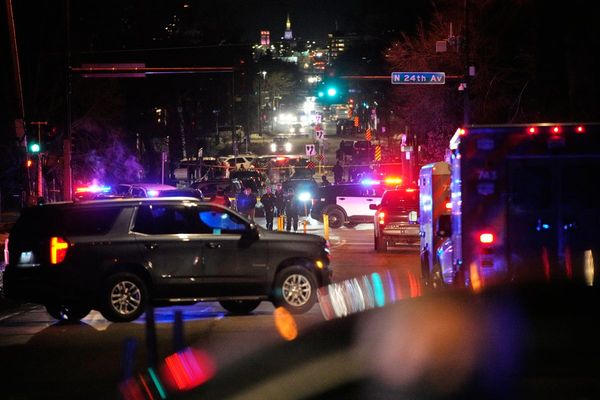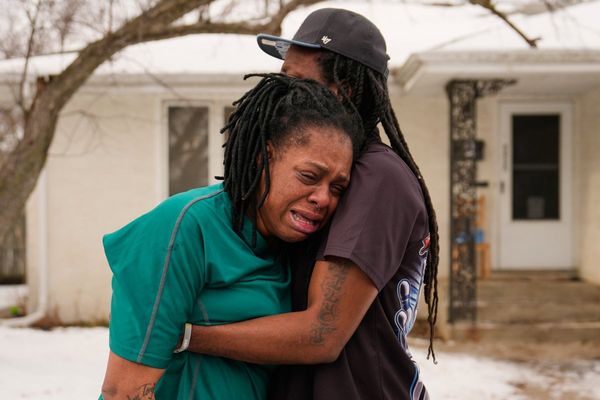On Sunday, for the first time in 1,285 games as a coach and 47 years in football, Carlo Ancelotti refused to talk about the game. He had just seen Real Madrid lose 1-0 against Valencia but, standing in the cramped, narrow tunnel that leads to the Mestalla dressing room where he said his best player sat “angry and sad”, he didn’t care about that and couldn’t comprehend anyone else caring either.
So when the standard post‑match interview began with the standard post‑match question, an enquiry as to his thoughts on another defeat, he decided that, actually, no, this wasn’t going to be standard any more. Instead, he shot back: “You want to talk about football?! Or shall we talk about the other thing? That’s more important than a loss, don’t you think?”
Maybe this time, at last, some will begin to think so. If the Madrid manager didn’t feel much like talking about football, it was because Vinícius Júnior, the kid in his care, the 22-year-old winger who is probably the most electric, most exciting player in the Spanish league, a genuine superstar for a new generation, didn’t feel much like playing it any more.
Why would he, why should he, when as he arrived at Mestalla a group of fans gathered outside had chanted: “Vinícius, you’re a monkey”? When from the south stand he had been told the same? When he had been told that he was an idiot, an imbecile. When he had heard the “oooh, ooohs”?
He had had enough. There was a moment in the second half when cameras closed in on Vinícius’s face, tears welling in his eyes. In its simplicity, its sadness, that may be the most powerful of many dreadful images from Sunday night, but the one that made the greatest impact, the one that started something, which gathered the kind of momentum that could yet mean something tangible, came when he literally made a stand, facing down the men who abused him. There were 20 minutes left when he pointed at a Valencia fan behind the goal, saying: “You, you, yes, you”, telling teammates that man there had called him “a monkey”; “he did this”, Vinícius said, imitating an ape gesture, hands tucked under his armpits. Alongside him, Lucas Vázquez confronted fans: “Shitty racists.”

The referee arrived on the pitch and police arrived in the stands. Ricardo de Burgos Bengoetxea spoke to Vinícius, explaining the protocol and asking him to trust him: first an announcement is made over the loudspeaker, and then, he told Vinícius, “if it happens a second time, we leave”.
Thibaut Courtois told him it had happened in the first half too and Vinícius was ready to go already. The PA announcement, warning the game could be suspended, was met with whistles.
Ancelotti, who has been through this before with Kalidou Koulibaly in Italy, spoke to the official and his player. “He didn’t want to continue,” he said, “but I told him it didn’t seem fair that he is the one that has to stop playing because it is not his fault: I told him you’re not the guilty party; you’re the victim.”
There was something in that message reminiscent of the awful sight of Mouctar Diakhaby, the victim of racist abuse sitting in the stands watching his alleged abuser play on two years ago. Ancelotti embraced Vinícius, then kissed him, supporting him in going on. Maybe they could have walked, maybe next time they will – “had he wanted to we would have gone with him,” Courtois said – but this time he continued. Until the last minute of a game that overran by more than 10 minutes – when he was sent off for thrusting an arm into the face of Hugo Duro who, in the middle of a melee, had him round the neck. As he went, he gestured to the Valencia fans that they were going down.
“The card made no sense,” Ancelotti said afterwards; even if strictly speaking it was deserved, it served to deepen a sense that somehow everything was upside down. As for the gesture, that was natural given everything he had been subjected to, Ancelotti said. Not just here, but in those other grounds too.
On social media Vinícius made the point this was “not the first time, and not the second or the third either” – there have been nine formal complaints made about abuse he has suffered this season – and described racism as “normal”, encouraged even.
He adopted the league’s slogan to insist that this “is not football, it’s La Liga”. Nothing, he said, gets done, nothing happens. The competition that “once belonged to Ronaldinho, Ronaldo, Messi and Cristiano, now belongs to the racists”, he said; Brazilians see Spain as a racist country that had left him defenceless. A subsequent post from his representatives likened him to George Floyd.
“If a stadium insults a player racially, the game has to stop – and I would say the same if we were winning 3-0,” Ancelotti said. “Stop the game, there is no other way. The referee says that the fans have to be informed first and if it continues, then we stop the game. But, for me, he doesn’t need to inform them. I am curious to see what happens now.”
The last line was pointed, so he was asked what he thought would happen. “Nothing,” he said. “Because it has happened lots of times and nothing happens.”
That suspicion was only deepened when Javier Tebas, the president of the league, went on Twitter and accused Vinícius of failing to understand whose responsibility it is to deal with racism and not showing up when they arranged meetings to explain the process to him, accusing him of insulting the country and the competition and suggesting he had allowed himself to be “manipulated”.
There may have been a point in there somewhere: the league and the clubs are acting with greater determination, with observers at every game. The nine complaints of abuse directed at Vinícius were investigated and brought by the league and handed to the authorities, while protocols and punishments do not depend solely on them. When the league filed a complaint about the racist abuse sung before the Madrid derby in September, it was state prosecutors that failed to proceed. The Espanyol fans they denounced to the authorities for abusing Iñaki Williams are due in court.
And yet immediately after the abuse on Sunday, the tweet was alarmingly tone deaf and the feeling that nothing is done naturally hangs heavy; there is something depressingly inevitable about it all and no escaping that the only time a game has been abandoned in Spain was when Rayo Vallecano fans accused striker Roman Zozulya of being a “Nazi”.
“Once again, instead of criticising racists, the president of the league appears on social media to attack me,” Vinícius replied. “Much as you talk and pretend not to read, the image of your league is damaged. Look at the responses to your posts and you’ll be surprised. By omission, you place yourself on the same level as racists. I want action and punishments; hashtags don’t move me.”
He, though, was moving something. No one else: him. By confronting his abusers and those he sees as their enablers – by making the stand himself – by speaking out, by refusing to back down, by fighting, something started. And although Ancelotti was challenged on his initial claim that the whole stadium had racially abused Vinícius – “this is not one person going mad, it is a ground” – when the chants he referred to had called the Brazilian tonto [stupid] not mono [monkey], there could be little doubt about the coach’s insistence “the league has a problem”.
That realisation may end in nothing tangible and there is impotence in lamenting another episode just to watch it happen again.
There are still too many of those that chose sides by team, although they are fewer now, at least publicly. There are still those that insist on the buts, even as Ancelotti insisted “there are no ‘buts’”, those that accuse Vinícius of being provocative, as if somehow that makes it OK. He is the only one who gets the abuse, some say, as if that does too, as if that even means anything, as if that limits the impact to him alone when it is the opposite. Others talk about this as just a way of putting off a brilliant player, as if that was a legitimate weapon.

But the hope, which may be hopelessly optimistic, is that it is inescapable now: they were being confronted with it. There were messages of condemnation for the competition and support for Vinícius, a media taking this on more before, a sense that it does matter, protocols and assumptions challenged.
It came not just from Spain but everywhere, a mirror held up, accusations obliging action. There were statements from the Brazilian football federation and the Brazilian president, Luiz Inácio Lula da Silva, from other clubs and players, including Valencia’s Diakhaby. Another investigation was announced. Valencia vowed to ban the fans identified for life. The Brazilian foreign minister called the Spanish ambassador. The fight is taken to them, demands made, threats hanging over them. Above all, by him.
“He’s sad and he’s angry, but sad most of all,” said Ancelotti, but he isn’t stopping. “I will go up against the racists until the very end,” Vinícius Júnior said, “even if it’s far from here.”
And if players such as him go, who is going to want to talk about the football then?







